Contrary to Popular Belief, Iodine is Quite Safe
Get out your pitchforks and get ready to get angry because it’s time to talk about iodine.
I’m joking (mostly)…
But we actually do need to talk about iodine.
I’m not sure what it is, but only a few topics in the thyroid world are more controversial than iodine.
Today we should be sidestepping most of the controversy, though, because we are going to be focusing on the side effects of using this special ingredient.
When it comes to your thyroid, iodine plays an important role in regulating its function.
Your body can’t survive without it and yet some people seem to respond negatively when using it.
The good news is that the reactions that most people experience when using iodine should be positive or non-existent.
And for those who do experience negative side effects, they can often be avoided or eliminated with the right treatment.
Today you will learn:
- What to expect when using iodine supplements
- How iodine impacts your body and triggers various side effects
- What these side effects mean for you
- A huge list of iodine-related side effects
- And how to prevent these side effects from occurring
Let’s jump in…
DOWNLOAD FREE RESOURCES
Foods to Avoid if you Have Thyroid Problems:
I’ve found that these 10 foods cause the most problems for thyroid patients. Learn which foods you should avoid if you have thyroid disease of any type.
The Complete List of Thyroid Lab tests:
The list includes optimal ranges, normal ranges, and the complete list of tests you need to diagnose and manage thyroid disease correctly!
What Causes Symptoms From Iodine Supplementation?
Before we talk about iodine-related side effects we need to establish baseline facts that will help direct the conversation.
The first is that all humans require iodine (1) because they can’t produce it on their own.

The second is that iodine is required for thyroid hormone production (2) and life cannot be sustained without it.
Therefore, you can draw a connection between iodine consumption and life.
While these are simple physiologic facts that really can’t be disputed, there are a number of people that experience negative reactions when using iodine.

And this should come as no surprise.
If iodine is so critical for life, it makes sense that it may have some impact on the body when using it!
But I want to make clear is that the side effects you feel when taking iodine are typically not caused by the iodine itself but due to other issues that were already pre-existing when you took it.
In this way, iodine is really unmasking other issues that were already there.
Unfortunately, iodine gets the blame but this isn’t always fair.
And, for the record, let me point out that the majority of people who take iodine do not notice a perceptible difference in how they feel.
This happens for about 90% of people who take iodine every day.
A small fraction, anywhere from 1-10% of people, may experience the negative reactions that we are about to discuss.
So if that’s you then this information will be helpful.
There are three main areas where reactions can stem from when you take iodine:
- The first is changes to thyroid function – This should make sense. Your body needs iodine to produce thyroid hormones (T4 and T3) so you shouldn’t be surprised that taking iodine may impact how much thyroid hormone your body creates! This can be good if you are low on thyroid hormone from hypothyroidism due to iodine deficiency. But it can also be a problem if you take too much iodine and end up overproducing thyroid hormone. Sometimes, taking iodine in the setting of selenium deficiency can lead to thyroid gland inflammation which can impact thyroid hormone production. Changes to thyroid function are a big reason why iodine is often recommended in high doses to people suffering from thyroid conditions. This may not be the smartest thing to do but at least you understand why some people make the recommendation.
- From detoxification – Because of where iodine sits on the periodic table of elements (next to the noble gases), other elements have a similar electron configuration in their outer shell. This means that iodine, and the other elements on that row, may compete for binding to the same locations. Taking iodine can displace halogens such as chlorine, bromine, and fluorine. When these are displaced your body will sometimes eliminate them through the skin (3) and this is what I mean by detoxification. This will make more sense when we talk about acne when taking iodine.
- From changes to other hormone systems (sex hormones) – Iodine can also cause symptoms based on its impact on other hormones in the body, especially your sex hormones. Iodine can impact estrogen metabolism (4) and may also indirectly impact estrogen and progesterone through its impact on thyroid function. The result is that you may experience symptoms related to changes in estrogen and progesterone levels when using iodine (this is usually for the better, though).
Notice when discussing the potential causes of iodine reactions I did not mention iodine allergy.
That’s because it’s impossible to have a true allergic reaction to iodine (5).
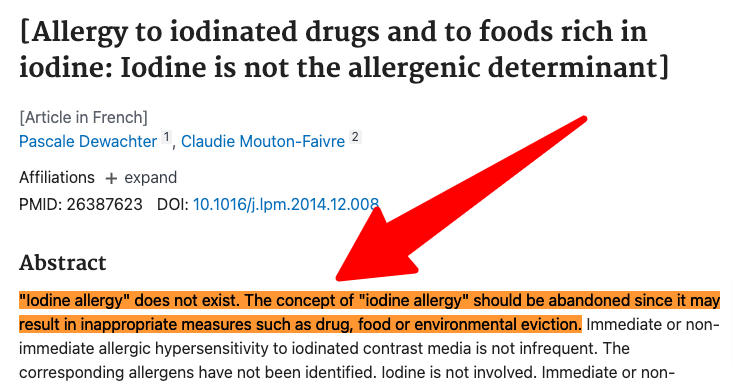
There are many people out there who have been told that they are allergic to iodine when that just isn’t the case.
This isn’t just my opinion either, researchers have concluded that allergic reactions to iodine are always caused by some other factor as opposed to the iodine itself.
You can read more about why true iodine allergies do not exist here.
Symptoms That May Occur When Taking Iodine
With all of this in mind, let’s talk about some of the symptoms that may occur when taking iodine supplements:
#1. Acne-Like Pustules
The first is acne-like pustules.
The reason we need to use the modifier acne-like is that iodine supplementation does not result in true acne but something that mimics acne.
It’s well known that iodine supplementation can result in acne-like pustules but what we don’t know is what exactly causes these pustules.
These pustules are known to be related to halogen elimination (as we discussed above in the detoxification section) but it’s not known if the pustules represent your body eliminating the halogens or if they are just an immune reaction in the skin.

One thing is for sure, though, you don’t want these halogens in your body!
Even though taking iodine may result in something that looks like acne, you should consider this a sign that your body is trying to eliminate something that doesn’t belong.
I’ve personally seen a lot of patients who take iodine, experience these acne-like pustules, and stop using the iodine.

This is probably the worst thing you could do!
You want those halogens out of your body because they are interfering with your thyroid, you just need to control how they are being eliminated.
If you experience acne-like pustules while using iodine then simply slow down on your dose and that should reduce or eliminate the problem.
Even if you continue at high doses, though, you won’t experience acne forever.
Eventually, the side effects will wane and you will get all of the benefits of iodine without that particular side effect.
#2. Racing Heart
Some people may experience a rapid heart rate or racing heart when using iodine.
This may or may not be associated with heart palpitations which are the sensation that your heart is beating out of your chest.
These symptoms tend to be associated with hyperthyroidism (6) and may mean that your iodine supplementation kicked your thyroid into overdrive.
#3. Sweating
Much like a racing heart, sweating hot flashes, or feeling flushed may be another indicator that your thyroid is in overdrive.
Sweating is a common symptom of hyperthyroidism.
#4. Headaches
Sometimes, taking iodine can lead to headaches or migraines.
It’s not known exactly what triggers headaches from iodine supplementation but is probably due to its impact on thyroid function, blood pressure, or muscle tension.
#5. Fatigue
If you experience fatigue when taking iodine then it’s most likely related to a change in thyroid function.
Both hyperthyroidism and hypothyroidism can result in fatigue so you’ll need to do some more digging to figure out which is the cause of your fatigue.
Low energy can also be associated with adrenal fatigue which is common among patients with thyroid disease.
#6. Changes to your Weight
Changes in your weight may be a sign that your iodine supplementation is impacting thyroid function.
If you notice that you are gaining weight while taking iodine then there’s a good chance that your iodine supplementation is slowing down your thyroid.
If, on the other hand, you notice that you are losing weight then that may be a sign that you are speeding up your thyroid.
Speeding up your thyroid for weight loss may not necessarily be a problem though, especially if you have an underactive thyroid.
Many low thyroid patients experience weight gain from their low thyroid and fixing that low thyroid can result in weight loss.
Weight loss in the setting of iodine supplementation is really only a big problem when it’s associated with other symptoms of hyperthyroidism such as racing heart, sweating, hot flashes, diarrhea, and so on.
#7. Nausea
Iodine supplements are usually very well tolerated but taking high doses may result in nausea or stomach pain.
This is usually from the supplement itself and not from its impact on your thyroid or other hormone systems.
#8. Stomach Pain
Stomach pain, much like nausea, comes from the iodine supplement itself.
#9. Metallic Taste in the Mouth
A metallic taste in your mouth may be common when taking iodine supplements because of the flavor of iodine.
Iodine drops have a sort of metallic salty flavor to them but this flavor is often masked when taking it in a capsule form.
If you take the capsule form and then experience reflux from your stomach you may taste the iodine.
This is very similar to what can happen when you take a fish oil capsule and then burp it up later.
You don’t taste the fish oil when you swallow the capsule but you sure do when you burp it up!
A metallic taste in the mouth may also be a sign of acid reflux, though, so keep that in mind.
Acid reflux is quite common among patients with thyroid problems due to the impact that thyroid hormone has on stomach acid (7).
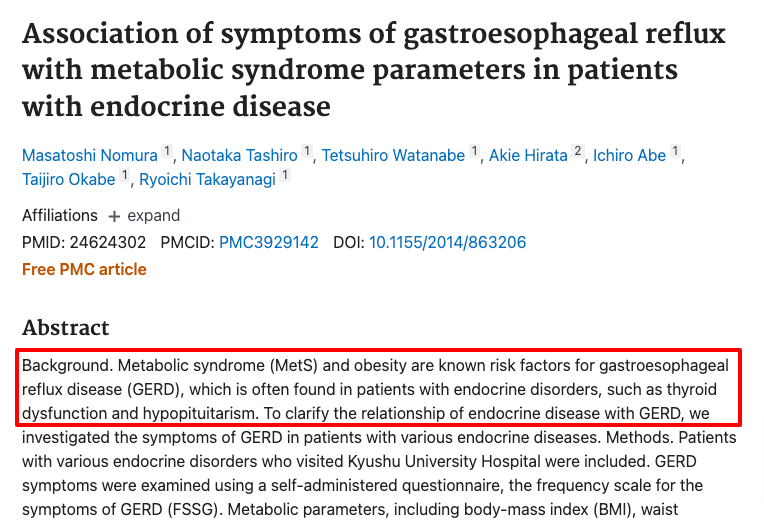
#10. Joint or Muscle Pain
Joint and muscle pain with iodine supplementation may be a sign that your iodine is impacting thyroid function.
Joint and muscle pain are often associated with severe states of hypothyroidism (low thyroid function).
If this occurs, it may be a sign that iodine is blocking how well your thyroid is working and you may need to adjust your dose.
#11. Changes to your Hair, Skin, or Nails
Both high thyroid function and low thyroid function can impact your hair, skin, and nails.
And both conditions can make them worse.
If you take iodine and notice that your hair, skin, and nails are getting better then it’s likely that iodine is improving your thyroid.
If you notice that your hair, skin, and nails (with the exception of acne as we already discussed) get worse then you may be pushing your thyroid into a hyper or hypo state.
#12. Thyroid Gland Pain
As I mentioned above, iodine supplementation can result in thyroid gland inflammation.
If severe, this may result in pain in your thyroid gland.
Thyroid gland pain is quite rare, even for inflammatory conditions such as Hashimoto’s thyroiditis, though!
It is typically associated with trauma or infection, both of which do not occur very frequently.
If you notice sensitivity in your thyroid gland (at the base of your neck) you will want to get evaluated by a doctor as soon as possible.
#13. Swelling in the Neck
Swelling in the neck is a symptom commonly seen in patients who have a thyroid goiter.
Goiter is just a term used to describe the enlargement of the thyroid gland and doesn’t refer to any specific disease or condition.
No matter the cause, though, it should be checked out.
You really do not want your thyroid gland to enlarge for any reason as it may ultimately impair thyroid function.
Sudden swelling in the neck after taking iodine may indicate thyroid gland inflammation or the triggering of something like autoimmune thyroiditis.
#14. Other Symptoms of Hyperthyroidism
In addition to some of the symptoms listed here, taking iodine can cause any or all of the symptoms of hyperthyroidism (excess thyroid hormone production).
For a full list of these symptoms please see this article.
#15. Other Symptoms of Hypothyroidism
In addition to some of the low thyroid symptoms listed here, taking iodine can cause any or all of the symptoms of hypothyroidism (low thyroid hormone production).
For a full list of these symptoms please see this article.
How to Avoid These Side Effects
You can easily avoid the side effects of iodine supplementation by doing a couple of things:
- Make sure that you have enough antioxidants before taking an iodine supplement – We know from thyroid physiology that creating thyroid hormone causes the creation of free radicals that can damage the thyroid gland. If you take iodine and stimulate this process but don’t have enough antioxidants to clean up the mess, you may experience problems! Should we blame the iodine for doing its job? No. Instead, we should focus on getting enough antioxidants either through the diet or through supplements to allow iodine to do what it needs to do. One of the biggest antioxidants that you can take to protect your thyroid gland from inflammation is selenium but there are also many others such as glutathione. An easy way to get these antioxidants is by eating plenty of fruits and vegetables.
- Take small doses of iodine – Iodine dosing is very much a Goldilocks kind of thing. If you take too much you will cause problems and if you don’t take enough you won’t see any benefit. For some supplements, it’s perfectly fine to take several times the multiple of the RDA (recommended dietary allowance) but this isn’t true of iodine. For best results, stick to iodine doses around the 150 to 300mcg (8) per day range. This will allow you to get the benefits without causing the side effects we have discussed above. You may start to get into trouble when you get to the 1,000mcg per day range or the several grams per day range.
- Make sure you aren’t getting iodine from another source – Lastly before you blame your iodine supplement for causing issues make sure that you count how much iodine you are getting from ALL sources. You may be someone that is getting enough iodine from your diet, in which case, iodine supplements may not be necessary because you already have enough. Iodine can also be hidden in supplements, medications, beauty products, or fortified in processed foods. If you are experiencing the side effects we’ve discussed then look on the back of the bottles of your supplements and medications and start researching ingredients to see if you are accidentally consuming iodine without realizing it.
Final Thoughts
Even though we just spent a lot of time discussing the side effects of iodine supplements I want to be sure that I reiterate that most people who use iodine will not experience any negative symptoms.
Most of the time, iodine is very well tolerated and the people that use it actually feel better (not worse)!
If you are one of the few that does feel worse, though, then use the recommendations in this article to help figure out the cause.
Once you find the cause you should be able to take steps to fix the issue and take iodine without any trouble.
Now I want to hear from you:
Are you currently taking iodine?
Have you noticed any of the negative symptoms or side effects listed here?
Do you know how much iodine you are getting from all sources on a daily basis?
Do you think you are consuming iodine from any hidden sources?
Leave your questions or comments below! View All References
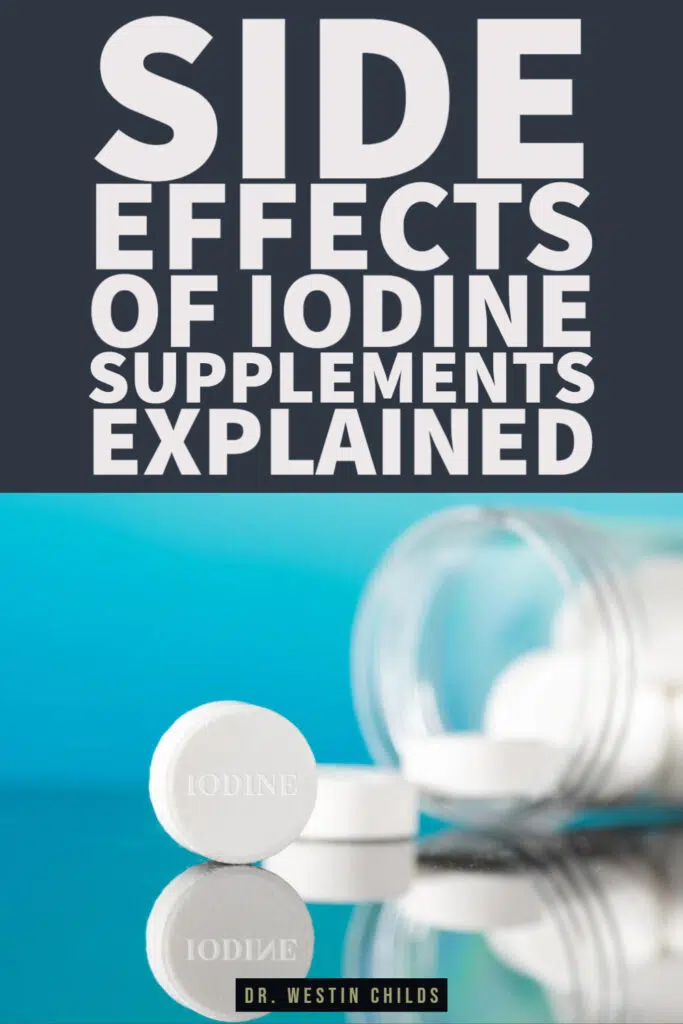
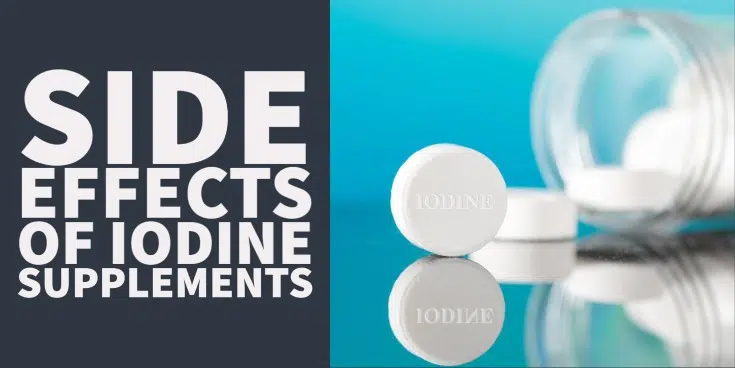

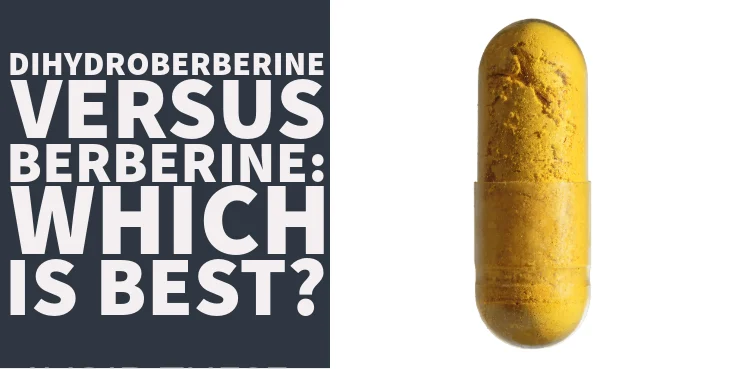
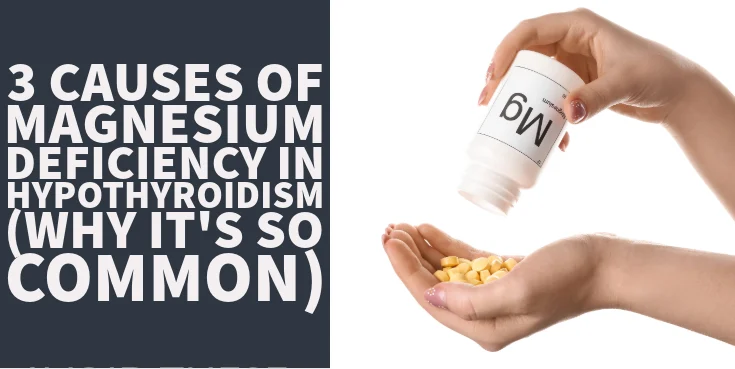
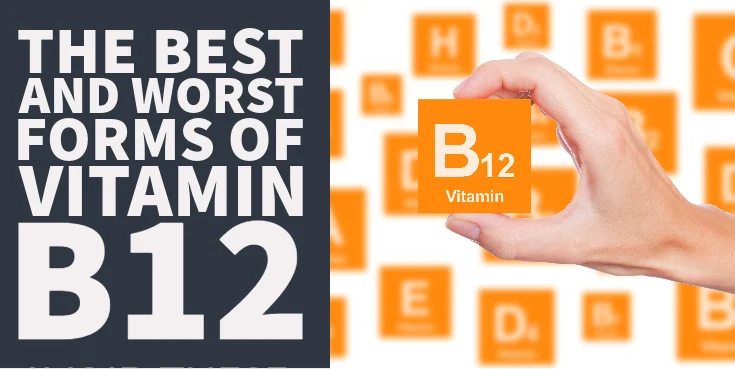
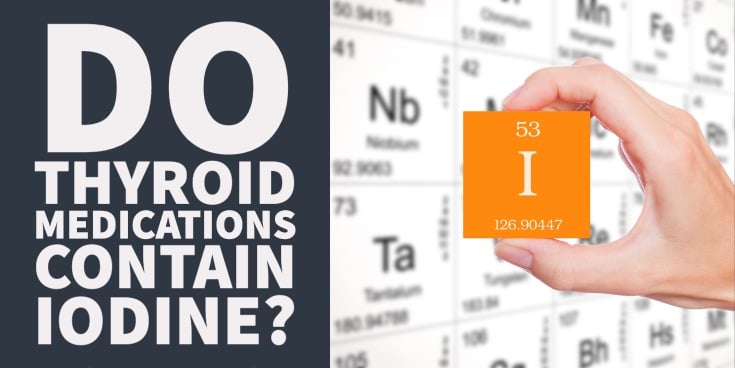
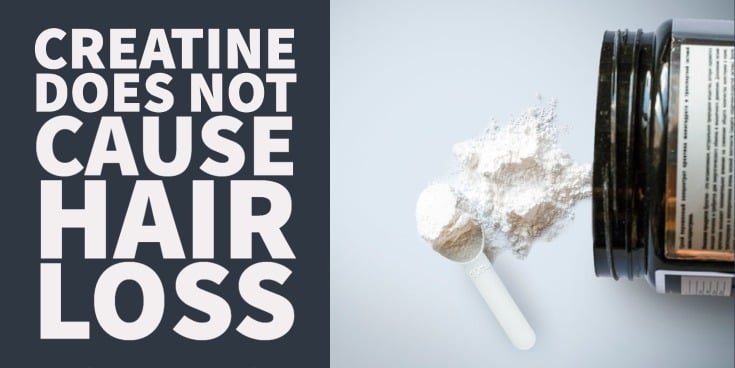


Hello
Without going into great detail, my query is about developing hyperthyroidism. I was taking iodine bought through global healing centre USA (I’m in the Uk) for 3 years after bioresonance tests showed I was iodine deficient. I also took selenium. After 3 years I stopped taking both products and also decided to revert back to normal eating (I had previously taken out wheat, dairy and eggs). A couple of weeks after this I suffered symptoms of hyperthyroidism and my blood tests confirmed this. Although antibody tests showed no Trab, and only slightly raised TPO. I’m wondering if you can shed any light on whether abruptly stopping the iodine alongside eating foods I was intolerant too has caused the thyroid problem? I’ve been on Block and Replace treatment since March 2021 and I’m due to come off this in July (Carbimazole 25mg/day, Levothyroxine 100mcg 5days/75mcg 2 days). I wonder if I have Hashimotos rather than Graves?
Hi Jane,
It’s very difficult to assess what triggered the event without a lot more information but if you are asking if that’s a potential plausible trigger of hyperthyroidism the answer is yes. Whether or not it’s likely or if something else is more likely, is another story. But many factors such as iodine intake and foods have the potential to trigger hyperthyroidism.
I
Two endocrinologists have stated my thyroid panel is normal. I sure you hear that a lot. I’m not a good converter but they refuse to medicate me. Have always been symptomatic. In my basic labs, my iodine levels are consistently flagged low. When I ask how much I should supplement I was told they really weren’t sure. Supplements sold in stores contain much higher levels than probably what I should be taking. To me, the question is what causes one to be consistently be iodine deficient?
I consume a healthy diet.
Hi Carla,
I do hear that a lot 🙂 If you want to see a list of optimal vs normal ranges please see this article: https://www.restartmed.com/normal-thyroid-levels/
In regards to supplements and doses, I have tons of information on just about every nutrient you can think of as it related to thyroid function. You can get an idea of recommended doses for things like zinc, iodine, selenium, magnesium, etc. in these articles:
https://www.restartmed.com/the-best-form-of-zinc-to-take-for-your-thyroid/
https://www.restartmed.com/high-dose-iodine/
https://www.restartmed.com/selenium-thyroid/
https://www.restartmed.com/magnesium-and-hashimotos/
https://www.restartmed.com/vitamin-d-and-hashimotos/
Iodine comes from specific food sources so even with a healthy diet there’s still a relatively high probability you aren’t getting enough from your food alone: https://www.restartmed.com/16-foods-with-iodine/
Hello my name is Karen. I have a question. I had my blood work done two weeks ago and my thyroid number was 263 saying it was high. I’ve been taking iodine supplements 2 pills a day on an empty stomach 30 mg. I’ve noticed my nails are doing much better but I’ve noticed some hair loss. Is my iodine level too high and should I stop or go down to one tablet a day.
Hi Karen,
A couple of things! What lab test was 263? Is that in reference to thyroid antibodies or some other lab test?
In addition, iodine lab tests are not accurate for the reasons listed here: https://www.restartmed.com/iodine-testing/
Hi,
I am wondering why when I take iodine, i have twitches like currents from the waste down, they are strong. When I stop taking iodine, they twitching goes away, it is almost like the muscles become over stimulated. What is the reason for this side effect?
Hi Jag,
That’s not a side effect that I’ve seen but apparently, it can happen to some people. I’m not sure anyone knows why as twitching in the muscles is usually secondary to changes in nutrients like calcium or magnesium.
Hi my name is Kathy and I had my thyroid removed 50 years ago. I have Graves Disease and I take synthroid 125mcg. Would taking liquid iodine 2 drops a day help me?
Hi Kathleen,
If your thyroid has been removed then your demand for iodine is much less compared to someone with a thyroid gland. You still need iodine but at much lower doses. Taking iodine in this setting will probably not have a huge impact on your thyroid function if that’s what you’re asking. There are better supplements you can use as outlined here: https://www.restartmed.com/thyroidectomy-supplements/
Yes. When you get injured in some way (life happens, accidents, child birth, infections…etc), normally your thyroid would have been releasing IODIDE (notice the difference) to help with taming excess inflammation. Also in my case, with long term inflammation, this is partly how the inflammation gets quieted down on “good days.” You can find iodide supplements usually in some combination with iodine. Both are needed by every cell in your body. Notice the doc said your need for it is reduced, not eliminated. If you don’t want to take pills, buy a sprinkle bottle of dulse or kelp from Maine Coast brand (dulse is not fishy), and sprinkle on your food. Look for the medical research of Mark Roth MD at Fred Hutchinson Cancer Research Center for more info about what else iodine does besides hang around in your thyroid.
Hi Dr. Childs,
Thank you so much for your information. I love your site and info. It all started for me about 3 weeks after the covid vaccine in 2021 (not sure if there’s any correlation). I became weak and within 2 weeks I had dizziness, vertigo, blurred vision, restless legs, brain fog, nausea, weakness, a non-stop daily migraine, shortness of breath, severe exhaustion. I kept telling doctors (12 of them and 3 ER’s) that I felt like I was going to die and that it felt like a deficiency. Long story short, after no help from doctors and a normal TSH and CBC’s, I googled all day every day (my family thought I was going to die), and I found “iron deficiency without anemia” by ESA Soppi. His journal fit me like an absolute glove. I begged doctors to check my ferritin and they wouldn’t and did not believe in it. The “causes” in Esa’s medical journal also fit me like a glove. I was a vegetarian, on PPI’s, with heavy menstrual periods for years. I trusted my gut and started taking 300mg of iron a day, split into two, on an empty stomach with vitamin C. I became much better within about 4 days, and continued to be better. I lost faith in the healthcare system. I continued to research and read, and found a naturopath. They tested my T3 and T4 and I had sublcinical hypothyroidism and a high reverse T3 and was prescribed Armour which made my reverse T3 higher. I changed naturopaths and found an amazing one, who added cytomel. My reverse T3 got better and I started to feel better but then I had TPO antibodies. They tested me recently and I am iodine deficient and now my T3 and T4 is below range. I can’t see my doctor for 2 months so I started researching iodine supplementation and started it. Side effects are severe stomach pain and diarrhea. I lessened my dose. Your site is fantastic to me because as I sift through the vast sea of knowledge about this stuff, I find that STTM and your site are spot on…. and I am truly grateful. I wish there were more doctors like you that we had access to.
Hi Robin,
Sorry to hear about your journey but glad to hear that you are doing better! In regards to iodine testing, I would recommend checking out this article as pretty much all methods of testing iodine are inaccurate and not the best way to determine if you need it: https://www.restartmed.com/iodine-testing/
Why do I feel weird after taking iodine supplements?
It seems to cause blurry vision and headaches also.
Hi Anna,
This entire article is all about explaining why some people feel weird when taking iodine supplements. I would recommend checking it out for more information!
Hi, nice article!! I just happened to look into it again as I have taken Iodine before and in the first 2? weeks it was great. It gave me a boost of energy. Was amazing but after a short while this effect went away and I had to stop as now it makes me just insanely tired. Overall I am in good shape but this is due to a strict diet. No processed foods and gluten and milk products. I mainly eat veggies, some fruit, rice and meat. No chicken and porc. This helped me to regain my health a lot. I am electrosensitive and watching my food carefully made me regain a lot of my health. My chemical sensitivity is almost gone.
But it is weird that I get SO tired from Iodine as I did feel it to be a good supplement. Any idea why I feel like a wet towel after taking Iodine? Is this something that you hear a lot?
Thanks
Patrick
Hi Patrick,
This is the first I’ve heard of that particular symptom. Many of my own supplements contain low doses of iodine and we rarely ever see any issues (they have been used by over 80,000 thyroid patients so far so we have a decent size sample size). I would say there’s probably something else going on here or it’s simply related to the dose.
I just ordered your Thyroid Glandular +. I’m trying to get off of my thyroid medication because of so many adverse effects from it. I noticed that in the Thyroid Glandular + it also includes iodine. I’ve been taking a supplement for hair growth with iodine from (kelp thallus extract) 50 mcg, zinc (oxide)11 mg, selenium (glycinate) 20 mcg. And I also take Source of Life Gold Chewables multi vitamin that has iodine (from kelp potassium iodide)150 mcg, zinc (as whole brown rice amino acid chelate, picolinate) 15 mg, selenium ( as whole brown rice amino acid chelate) 70 mcg.
With these supplements that I’m already taking and the Thyroid Glandular +, is that too much iodine? If I need to, I could cut back on the Source of Life vitamins which I take 3 of those chewables a day. What do you recommend?
Hi Kathy,
You shouldn’t have any issues with that dose of iodine. In general, a good rule of thumb is to stay around 300mcg total of iodine each day, but that’s just a rough guideline and many people can tolerate doubling that without any issue. You really don’t start running into trouble with iodine intake unless you are hitting several grams of iodine per day.
Someone told me you dont have to take iodine if you are on NDT because it contains iodine? Confusing.
Hi Amanda,
NDT contains around 130mcg of iodine per grain so it is possible to get enough iodine from NDT alone, depending on your dose.
I took the high dose of iodine from your range and put on 30 kilo now I have hashimotos hard to lose weight I just received your T2 supplement is that safe to take without suppression og the t4 t3 hormones thankyou
Hi Vivki,
Essential T2 will not cause suppression of T4 and T3 so that won’t be an issue.
Should one take iodine with Graves’ disease?
Hi Pj,
My opinion is that iodine is still important if someone has Graves’. You just want to make sure that you don’t take anything beyond the recommended dosing of 150 to 300mcg per day from all sources. I’ve had discussions with hyperthyroid experts who also agree with this strategy.
Really helpful article, Dr. Childs. I’ve been supplementing with kelp for over a decade and have no problems, but your sensible article brought back memories—of that initial salty metallic taste, and the surprise of ovulating and getting my period (just once) after a year without it in menopause.
Hi Mariam,
Glad you found it helpful!
This article came into my inbox at a very oportune time. I have some “acne” on my face this week and they are not like regular acne, more like maybe one of the pustules. So, I am adjusting my iodine regimen to be a smaller dose and more consistent on the daily basis (I had been told by a practitioner that I could take it 3x per week but at a higher amount, mainly because of the fact that the Lugol’s tablets came in that amount). So, thank you for this article!
Hi Rachel,
Just be cautious with very high doses of iodine. If you poke around the comment section on my blog you will see examples of people who’ve taken very high doses of iodine and ended up with Hashimoto’s or Graves’ disease. It’s not common but it definitely does happen and is one of the reasons that I recommend against very high doses for most people: https://www.restartmed.com/high-dose-iodine/
Hi , didn’t feel if i was taking too much food rich with iodine. I eat a lot of seaweed , kelp and my last TST was 9.77 H , Free T4 was .9 ,T3 , free was 2.6 .Negative on antibody and
IODINE, SERUM/PLASMA was 537 . Feel great but having hard time to stabilize the thyroid .
What about iodine and thyroidectomy. Do we still need it , does it affect the medication ?
Hi Kathy,
Those without a thyroid still need iodine but their demand is less than those with a thyroid gland. Other tissues in the body still need iodine, though, so it’s not something you want to neglect even if your thyroid has been removed.
i take iodine drops in the summer sometimes because it makes me feel cold.I presume it lowers my temperature.
Hi Mary,
Very high doses of iodine can have a thyroid suppressive effect so that may be what you are experiencing but it’s hard to know for sure.
I know iodine is critical for well being and health, and I want so much to be able to take it. I used to take it 20 or 30 years ago with no problems. Gradually, something changed and I began to have negative side affects.
The main one being increased levels of antibodies, feeling hypothyroid, and the goiters on my thyroid enlarge when I try even low doses. I take selenium, zinc, NAC & DMG. I just skimmed your article, but I am going to go back and read it more carefully. Dr. Childs, I would appreciate your input if you have any. Thanks for the great article!
I’ve been hypothyroid for a number of years and take Armour Thyroid for it. I also have severe RLS for which I was prescribed alprazolam. It works great for controlling RLS, but has caused my TSH to triple in 6 months. So tired I couldn’t get out of the recliner! Because of this unwanted side effect, doc is slowly weaning me off the benzos and intends to put me on methadone in accordance with the latest Mayo Clinic guidelines for retractable RLS. We’ve tried every substance on the market for RLS, all were complete failures for me. I’ve been putting a couple of drops of Lugol’s iodine in my drinking water plus I take selenium 2 or 3 days a week, and finally I feel like I’m coming out of the fog! I was tested for adrenal insufficiency (results were normal) and doc thought I possibly had chronic fatigue. He upped my Armour Thyroid dose and along with the added iodine, I feel good enough to resume my exercise routine at the gym three days a week. Will methadone cause thyroid problems like alprazolam did? I’m hoping this will get my thyroid function back to where it needs to be. I’m a 76 y/o female and the last thing I need is to develop sarcopenia due to inactivity. What do you think about methadone and thyroid function?
Hi Karen,
Certain narcotics have been shown to interfere with thyroid function so it’s possible that methadone could also cause issues. Here’s one study which suggested it doesn’t cause issues, though: https://www.ncbi.nlm.nih.gov/pmc/articles/PMC6354949/
Hi Dr. Child’s. You mentioned earlier regarding how iodine can throw off ones sex hormones. I noticed when I started taking your complete hypothyroid bundle and the T2, that my breasts started swelling and have become sore. Could this be due to the iodine? I’m getting about 300mcg total a day not including the food sources.
Hi Tbamagic,
It’s unlikely due to the iodine and more likely due to the fact that altering thyroid function tends to have an impact on the menstrual cycle. It’s very common for thyroid medications, when working appropriately, to cause more intense menstrual cycles for a few months as the cycle regulates. This is particularly common with T3 use and is not an indication that you are doing something wrong, just that your thyroid is becoming more regular. It could happen with iodine but the effect is typically less pronounced and would probably not be noticed with such a small dose.
Hi Dr. Child’s,
I was diagnosed with Hypothyroidism In 2014 after complaining of cold feet that eventually led to PN bilateral PN that they classed as Idiopathic. I have always believed that my Hypothyroidism is the cause. Dr’s have bounced me on dosages and I started to take 80mg and 100mg Levo alternately based on how I feel and dry skin. I stated to have impotence in 2010, 4 years before the PN and have low T at 3-4 ( I am in Canada so our range numbers are/may be different).
They say my range nu.bers are in normal range and they say being at .3 to .6 is perfectly fine even though I feel like crap. It is extremely difficult to get GP’s or even Endo’s to order tests. I research and ask though. The only test out of their normal panel was an antibody test…came back normal. I have low energy levels and at 71 I look like late 50’s and when taking t-gel 5% I feel better but they bounce me on that as the dose put me well above 18 (felt good though…but still impotence!). SBGH?? They dod not check that nor my free T.
Your thoughts? Could Hypothyroid be cause of my PN??
Than you Greg
Hi Greg,
Hypothyroidism has the potential to cause peripheral neuropathy but really only in severe and prolonged cases. I would say it’s unlikely to be the primary cause unless you’ve been suffering from severe hypothyroid symptoms for a while.
What is nascent iodine? Should you take it? I’ve seen the dosage is 1950 mcg in a solution and 3 drops per day. Is this effective?
Hi Marie,
Nascent iodine is a form of iodine that contains an electromagnetic charge. A daily dose of 1950mcg would be considered high and would put you at several multiples over the RDA. You can learn more about iodine dosing here and why I recommend low doses: https://www.restartmed.com/is-using-iodine-safe/
I formulate my own thyroid support supplements with much smaller doses of iodine to match my recommended intake. You are certainly welcome to take higher doses but I personally don’t believe the potential benefits outweigh the potential risks and I’ve written about that in other articles.
What about people with atrophic thyroiditis? Do they need iodine since their thyroid glands are no longer making hormones and they get all the thyroid hormone they need from drugs (which also contain iodine if I´m not mistaken)?
Hi Anna,
Other cells and tissues in the body still need iodine so there will always be a small baseline demand for it even if the thyroid is missing/atrophied. All thyroid medications contain a source of iodine that is eventually recycled by the body and that would likely be sufficient for daily iodine intake in these cases but there’s virtually no risk to increasing your dose in this setting because the thyroid is no longer present and most iodine-related side effects come from the thyroid. It would be better to take too much than not enough in cases such as yours, at least in my opinion.
You didn’t mention the formation of cherry angiomas from iodine supplemtation. Can you explain what causes them and how to remove them and how to prevent them when taking iodine. Thank you!
Hi Valerie,
The exact cause of cherry angiomas is unknown but there have been case reports that suggest they can sometimes be caused by halogens and that iodine may be a potential treatment. If that is true then the use of iodine could theoretically precipitate their creation by assisting in the elimination of halogens but this is purely speculation.
What about subacute thyroiditis and iodine? I have had subacute several times (confirmed by uptake) and I always get hyperthyroidism before the subacute. I also have pain in the front of my neck as well. I have noticed if I eat salmon more than once per week my thyroid symptoms seems to worsen. Any ideas? PS I can not take biotin either for the same reason
Hi Susan,
I’ve personally never seen iodine-induced subacute thyroiditis but there are case studies to suggest it exists: https://www.sciencedirect.com/science/article/abs/pii/S0002962915360808
Biotin is a B vitamin that is essential for life so it’s highly unlikely you are reacting to it. A true reaction to biotin would not be compatible with life since your body and cells need it and the human body is unable to produce it on its own.
Just FYI Dr. Childs. I have what I’ve been calling ME/CFS for lack of a better term. I’m pretty sure it’s a holdover from when SARS got me in 2004, but that’s a long story. I also can’t take biotin in large doses. Maybe it’s the formulation. I also can’t take folic acid, only the methyl folate version and even then, in small doses. And if I so much as drink 1/4 of a glass of wine I get a migraine. This happens with ultra pure vodka too, 1/2 shot and I feel it coming on. So yeah, believe your patients if they say they can’t take a supplement. They’ve tried. Even if it’s “incompatible with life” it can still be true. That’s why we’re sick.
I recently had a sonogram of my thyroid and it showed 4 nodules. My thyroid tests all come back low normal. My doctor does not believe I need any follow-up treatment. Before I started going to my current primary care doctor, I was being treated for low thyroid. My current doctor took me off the thyroid (armour) saying I didn’t need it. In the past year I have gained 30 pounds. I think it may be because my thyroid is too low. There is family history of low thyroid. Do you think I should seek another opinion or seek further treatment?
Hi Laura,
From a conventional medical standpoint, there really isn’t any treatment for thyroid nodules except to watch and wait or to surgically remove them. There would be a need for a second opinion to re-evaluate your thyroid lab tests if you feel you are symptomatic but thyroid nodules rarely cause thyroid dysfunction themselves. If your thyroid is dysfunctional then it’s very likely not from the nodules and from something else. At the very least, I would recommend comparing your lab results to the ranges found here: https://www.restartmed.com/normal-thyroid-levels/
If you are looking for a second opinion then this resource may help: https://www.restartmed.com/how-to-find-a-doctor-to-treat-your-thyroid/
If you go from one conventional doctor to another, though, you are unlikely to get any further help regarding your issues. For this reason, you will likely need to look outside of the conventional medicine.
I have been using your T3 conversation booster. I take Thyroxine 88 mcg daily. I have a good response and a bad one. The good one is I have slowly been losing weight. I am 5’3” and started out at 196 and now weigh 180.
My problem is extremely dry skin. Is that thyroid related?
Hi Sherri,
Absolutely, dry skin is a classic symptom of hypothyroidism. Having said that, we are in the winter months and cold weather can also cause dry skin so before you blame your thyroid, make sure you rule out the obvious causes first!
You can learn more about the skin manifestations of Hashimoto’s and hypothyroidism here: https://www.restartmed.com/skin-conditions-caused-by-hashimotos/
And you can see the full symptom list here: https://www.restartmed.com/hypothyroidism-symptoms-checklist/
Hi Dr Childs I was taking your high dose of iodine which It then caused hashimotos I put on 30 kilo and all the other issues that come with hashimotos I just received your t2 supplements will this further suppress t4 and t3 is my question I have asked you this before with no reply will really appreciate to hear from you
Hi Vicki,
Based on available research, T2 doesn’t have any impact on TSH until you get over the 300mcg/day range. The 100mcg/day dose that I recommend using puts you well below this range so it shouldn’t impact your thyroid lab tests.
HI Dr Westin, I have normal thyroid blood work but a thyroid ultrasound showed that I have hypothyroid and nodules. An osteopath put me on two Natural dessicated thyroid tablets daily along with 8 drops of 2% lugols and vit D daily. I’ve had a sore shoulder since starting this regime. I’ve never had a sore shoulder before. Do you think I am reacting to the iodine? Should I stop or lower the iodine or increase salt intake? Thanks
Hi Fran,
I’m unaware of a connection between shoulder pain and iodine use. There is a connection between hypothyroidism and frozen shoulder which could be what you are experiencing. You’d need to get further evaluation to figure that out, though!
Hello Dr. Childs,
I’ve recently experienced a series of serious side effects from topical iodine that I had never had before, including but not limited to:
1. Scary muscle cramps in legs especially in heat (I am very sensitive to heat and feeling quite sick overall after prescription drugs and supplement usage; I’ve stopped sweating almost completely especially in hot weather conditions, even when it’s mildly warm);
2. Meniere’s-like attack with strong vertigo and one ear going shut suddenly;
3. Nighttime itchiness and rash all over my skin which has eventually stopped maybe a month after quitting iodine;
4. Nausea (applied iodine transdermally only on one hand, no oral supplements)
I would appreciate it if you have any comments on my case, Dr. Childs, the cramps were so bad I could barely take a shower without getting too stimulated and all spastic.
Sincerely
My wife had her thyroid and couple of her calcium glands removed so will taking iodine help in this case?
Hi Doug,
It won’t have any pro-thyroid effect because her thyroid is gone, but the iodine is still beneficial for other tissues.
Hello Dr. Childs,
Thanks for this info. Ive been searching everywhere for info on this.
After over 10 years of hair loss, fatigue etc my dr tested for and found an iodine deficiency by urine test and put me on Iodoral 12.5 daily. I took it for 4 years with no real change. The last couple of months I took it, my hair loss and fatigue improved. I returned to my normal weight with no effort. I started sleeping well. My hair texture changed back to its normal and it started growing. I got my first haircut in years. Then on routine bloodwork my TSH was <0 so he discontinued the iodine. That was in September 21 . My resting heart rate was high (120ish)and I had muscle weakness and leg swelling.
After 6 months off the iodine (April 22), over half my hair all fell out, I gained 15 pounds and fatigue returned. My dr retired in the meantime. I now take selenium, zinc, magnesium but I didnt when I took the iodine. Should I restart the iodine? It took 4 years of 12.5 mg for it to get to hyperthyroidism.
Hi Bethany,
It would be a good idea to get your thyroid labs retested before making any decisions about iodine use, just to be on the safe side.
I am low in iodine and a few weeks ago I began taking Genestra liquid iodine. I was taking 1 drop a day (150mcg) and did fine for the first week. On week 2, I began feeling pressure in my head, primarily around my temples. I then began feeling tension and pain going across the top of my head. I stopped taking iodine at this point. I have read about iodine and failed to connect the dots between my symptoms and iodine because there is not much literature talking about this kind of reaction. I thought maybe my symptoms were triggered by something else. I went to urgent care and even had an MRI of my head and everything came back clear. I started taking iodine again yesterday and my symptoms are now back.
How am I supposed to increase my iodine levels if I am having a response like this when I take iodine? Do you believe eating nori every day would be enough to bring up my levels? I am sure it depends on absorption of course. When I discovered that my iodine was low, I became hopeful that by increasing my iodine maybe my thyroid would function better.
I remember reading that if you have a negative response to iodine, it may be a sign that something else is off?
Hi Amber,
It’s usually best to take iodine with other thyroid-supporting nutrients (as mentioned in the article). You can get an idea of what type of ingredients you should take it with by looking at this supplement: https://www.restartmed.com/product/thyroid-daily-essentials-thyroid-multivitamin/
Hi Dr. Childs,
I have a transient low T3, with a diagnosed chronically low iodine. I read your replies to others about how this can be incorrect, but this seemed to make sense with my complaints of chronic fatigue, depression, and trouble losing weight (among other hypothyroid sx). I have tried taking iodine (PCP and Imtegrative Medicine doc recommended) in just about every dose (75mcg-500mg daily) and each time, as soon as I get a routine down of taking it daily, I get nasty headaches and migraines. I know your article above addresses this as normal and physiology unknown, but is there any remedy for these headaches? I have noticed so many other good benefits that it feels like its working great otherwise! Side note: I will say, I am glad you explained the acne. I thought it was a negative sign, and combined with the headaches, possibly a sign of toxicity!
Hi Denaya,
Unfortunately, I’m not really aware of any treatments that remove the headaches associated with iodine use outside of standard headache treatments.
Hi Dr. Childs,
I have been supplementing with IODINE for years. However, over the past 6 months, I have been noticing acid reflux. I also noticed that it happens when I take my iodine. It would last for a day or two. I quit taking iodine and the problem subsides. Have you any thoughts regarding this action-reaction. Thanks so much in advance! Kelly
Hi Dr. Childs,
I’ve been put on iodine as a part of a preconception protocol. I’m also battling severe anxiety. It’s been suggested by another doc that the iodine and anxiety might be at least somewhat related. Have you come across this at all? I can’t find any information online that suggests that this might be an issue, but am also aware that the internet isn’t always right!
I tried stopping the iodine for a period of time and it seems like things MIGHT have improved, but life circumstances make it hard to tell for sure. I’ve also noticed an impact on my hormones that make me want to stay on the iodine… but not if it’s going to make me extremely anxious. Just wondering if you have any thoughts.
Thanks!
Hi Jess,
High-dose iodine could, theoretically, increase thyroid function which can trigger anxiety so this is definitely possible.
I started taking nascent iodine but I am concerned either my body is now heavily detoxing or I’m taking too much iodine daily, I started at about 500mcg and then got a new bottle of detoxidine which has 1,950mcg per serving of three drops, I have been taking about three times that a day and last two days I did that twice a day, I think that’s too much for me as I’m feeling like I’m detoxing but I’m inspire as I’ve had some health issues for several years do I’ll have to dial this iodine rx down to 300-500mcg a day and see how I’m doing, I have currently mild Headaches, moderate body aches, and nausea that often feels like I need to vomit but I can’t!
I know I’ve been carrying toxins for many years and especially the Mercury in my blood tests was always flagged! I had really heavy menstrual cycles monthly and miscarriage three years ago, and severe hair loss ongoing since, but my hair loss has almost stopped totally since iodine tx, at this point I’m conducting my own personal independent health research on myself and family! I feel destined to help others heal from deficiencies and toxic living!
Hi Chasity,
I would recommend reading this article for more information on iodine dosing: https://www.restartmed.com/stop-taking-high-dose-iodine/
I’m 40 years old. Up until the age of 35 I was in excellent health, with the exception of sexual dysfunction following an injury in my 20s. I read about something called “iodine painting,” which involved applying iodine topically to the genitals as a potential treatment for the sort of issues I was having. I think I overdid it, and after a week or so I began to feel very ill, experiencing many of the symptoms of iodine overdose that you’ve listed here.
I discontinued my use of iodine and temporarily felt better, but as time went on I experienced a number of changes to my health and appearance: weight gain (eventually putting on 60 lbs), bags under my eyes, changes to my bowel movements, fatigue, chronic pain, high cholesterol, weakness, hoarseness, peripheral neuropathy, dental issues (teeth turned brown and developed cavities after having excellent teeth my whole life), etc.
I suspected a thyroid problem, but doctors kept telling me that my labs were normal and did nothing to help me. Eventually I sought out a holistic doctor who told me I had high inflammation and high reverse-T3 as well as poor liver function. She told me to quite drinking and put me on a whole foods diet and a bunch of supplements (including iodine, which I was skeptical of given that I believed iodine poisoning to be the cause of my problems). After a few months of following her advice some of my labs were improved but overall I felt worse than ever. I continued to eat healthy, but discontinued the iodine supplementation.
About 10 months ago, in addition to my other symptoms I began to experience frequent heart palpitations and anxiety. After living with these symptoms for a couple months I found a DO with a functional medicine background who ran a bunch of labs and diagnosed me with HYPERthyroidism. This came as a huge shock to me because aside from the palpitations/anxiety, all of my symptoms seemed to point toward HYPOthyroidism. My thyroid ultrasound was normal and I’m currently awaiting a thyroid uptake scan. In the meantime I’m on methimazole and a beta blocker, which have helped reduce my palpitations/anxiety but haven’t affected my other issues (slow metabolism, joint pain, fatigue, etc.). I’m very confused about what is actually going on with my health and what the proper treatment should be. Any thoughts you might have about my situation would be greatly appreciated.
Hi Dr Child’s
I began taking iodine drops 288micrograms once a day, around a week ago and I’m unsure if this is due to the iodine itself or detox/underlying viral. I was fine the first 4 days on it and then I began to have a tickle and burning in my throat which then spread to my ears and a dull headache and tightness in my jaw. Day 6 now and it feels like it’s turned into the most intense burning pain in my ears and throat. My throat is so dry and excessive mucus. I feel very fatigued, foggy in my head and my throat is the worst at night
My functional medicine dr ordered a iodine urine test that showed I was deficient. He told me to take 12.5 mg iodoral a day. He left me on that dose for 3 years and never checked it again. Eventually, after almost 3 years my hair started growing, I lost weight and I became hyperthyroid (high hr, leg swelling, voice changes) so he said stop all iodine. After about two months of no iodine, my hr returned to normal legs stopped swelling. About 4 mos later my hair fell out and I gained 15 lbs in one month. Did it take 3 years at 12.5 mg a day to correct the deficiency? And a few months to become deficient again?That dr retired and the new one says no iodine. My hair is falling out ands I’ve gained 15 lbs. I don’t know who’s right and if I should take it or not. 3 years at 12.5 mg to become hyper seems like 300mcg daily will never be enough to correct deficiency? I don’t eat any seafood but take a multi with 100% RDA iodine. Any thoughts would be helpful.
Hi Bethany,
Iodine tests are not accurate, unfortunately, so basing your iodine dosing off of those results is not ideal. You can learn more here: https://www.restartmed.com/iodine-testing/
I forgot to say in my last question the new dr put me on 60 mg NP Thyroid. I can’t tell any difference though. My tsh was almost 3 reverse t3 was 19. When I asked before, you said to check thyroid levels but I forgot to include that.
What do you do if iodine causes hyperthyroid symptoms and decreases your TSH and increases your free T4.
Hi Susan,
Some people do well with iodine avoidance. It sounds like you may be one of those!